June 04, 2015
One question is always interested me, whether there was a love in the front? Very interesting answer was given by the acquaintance of my parents, 85 year old Slupash Iztleuva.
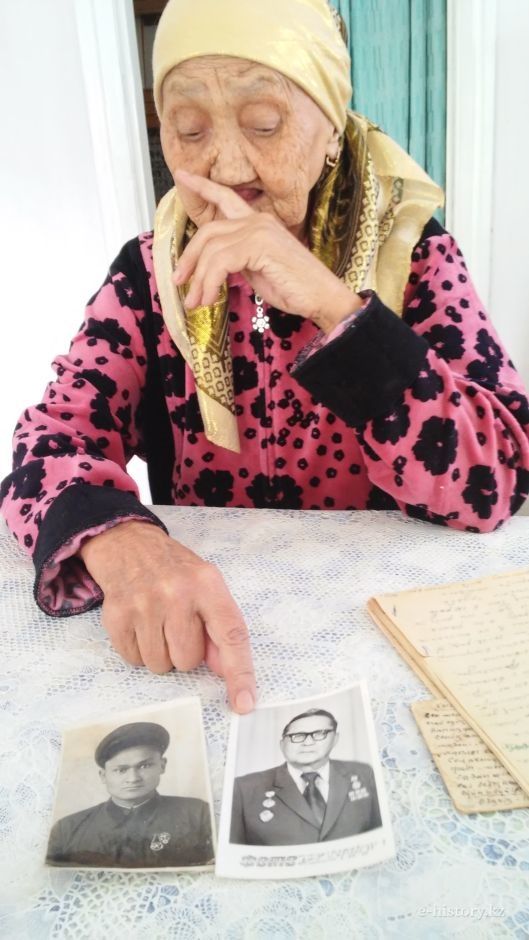
Esenzhan Dzhaugashin went to the front in August, 1941. At that time he was 32 years old. His mother, wife, son, daughter and little sister waited him at home. At war he was as a party of the 312th shooting division, and managed to reach Germany. He was scout and mortar.
312th shooting division was formed in Aktubinsk after 3 weeks of the beginning of the war. In September 1941, Esenzhan Dzhaugashtin together with others fought for Moscow.
From the diary of the soldier: "1941. He began the fight in the last dates of September. It is had been long time since we fighting with Germans for the village near Maloyaroslavets. Moscow was 130-140 km from us. We got prepared and armed. Machine guns were only 2-3 pieces on whole division. We are covered ruthlessly with mortar fire. Compare to Germans we are lacking of fighting and stronghold skills... Order of the divisional commander: "The village should not be taken over by Germans!" We stayed strong despite the fact that we are poorly armed. Only by the end of fight we realized that lost many people. My heart trembled when I saw my military friends — Gubashev from Uralsk, Izembayeva — the director of Aktubinks theater, Kelebayev from Karabutak. These victims remained hard feeling of grief at my heart".
Later he will write: "A year later we became skilled soldiers. From March to June, 1942 were in the Sinyavinsky wood. I am the mortar of a separate mortar company".
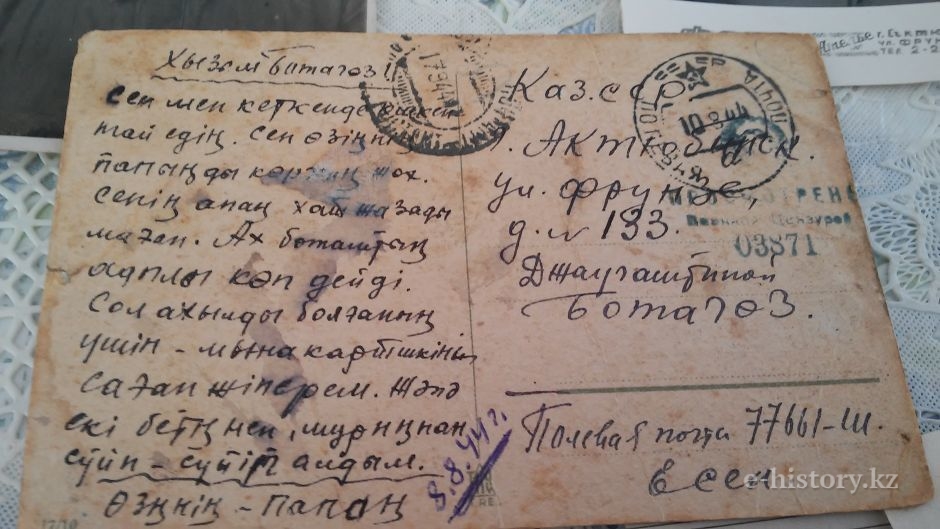
"The brother protected Leningrad. At that times his correspondence with Eugenia Solovyova began" — says Slupash Iztleuva. — "Soldiers stopped on a smoke break. Suddenly they saw a humpbacked old woman. It was unclear how she came to the front zone. Leningrad was only in 25-30 kilometers. Someone from fighters shouted: "The old woman, throw this letter into any mailbox", and from all directions soldier’s triangles departed to her. The old woman brought together them, and hid in the bottomless pockets. Esenzhan also wrote a letter, and asked: "Give it to the most beautiful girl of Leningrad". There he wrote: "I am a veteran, I want to correspond with you, and specified the address of field mail — 7761 "B". He did not manage to write a surname, only a name. And after a while received the answer: "Dear veteran Zhan. The old woman gave me your letter.
I am ordinary Russian girl. I cannot judge about beauty, but I am ready to write you. And you write about the fighting affairs. We know how it is difficult for you. For us is also difficult, but we will withstand. Please keep away Germans from our city. Eugenia Solovyova". She understood his names as "Zhan" and "Esen" as a surname. She worked at military plant and wrote about Leningrad’s affairs. Brother wrote us about war. He began his letter, and his military colleagues added something from themselves. Everybody all together read the answers from Eugenia. She worked 14 hours a day. Blockade, ruin and hunger, but she had time to write inspiring letters to our soldiers. Brother told that these letters lifted spirit to fighters".
Esenzhan remembered: "In February, 1943 she sent the first photo. The girl was extremely beautiful, but looked thin. On May 7 Eugenia sent me one more photo, where she looked better. She was 22-23 years".
This is Eugenia’s letter kept by the sister of veteran.
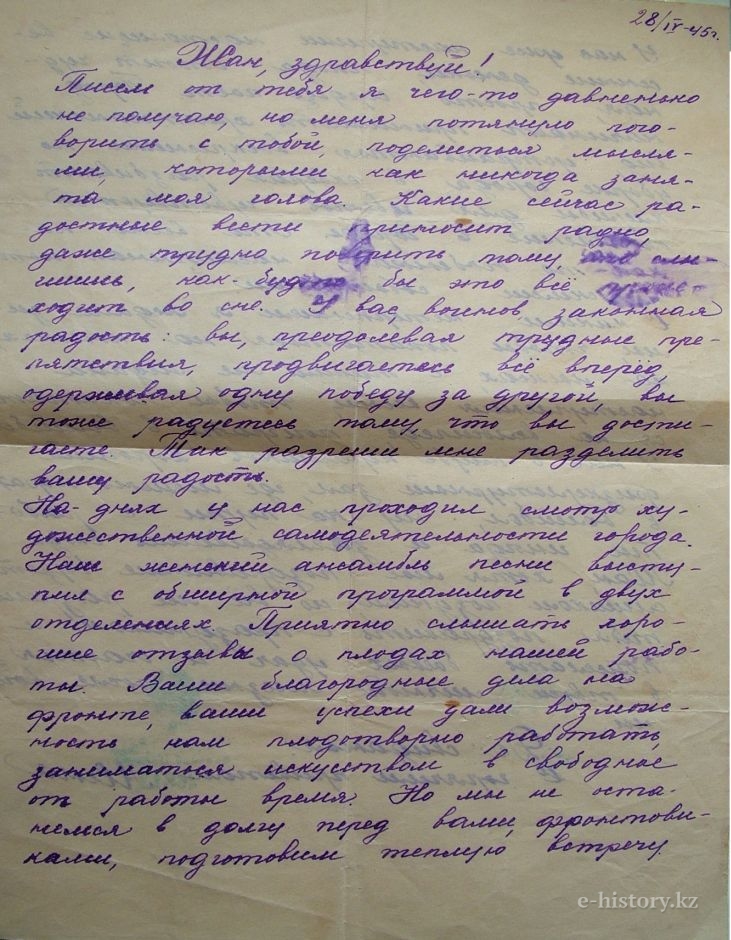
"28.04.1945. What joyful messages are broadcasted on radio. It is difficult to believe what you hear... You, soldiers have a lawful pleasure: you, overcoming difficulties, you win one victory for another. So allow me to share your pleasure.
Recently we had arts festival. Our female ensemble made the extensive program. Your noble acts gave at the front gave us inspiration to work productively. We will prepare a warm meeting to you.
Spring already came. The weather was wonderful. The city began to look nice. This spring is special...
Zhan, let me to congratulate on a holiday and wish success and happiness in your private life after war".
Esenzhan’s address of field mail soon changed. Eugenia’s enterprise was shifted to the south part of the country and their correspondence finished. After war Esenzhan did not seek for Eugenia. His wife, daughter and son were waiting for him at home, but he always kept the warm memory about Leningrad girl — Eugenia.
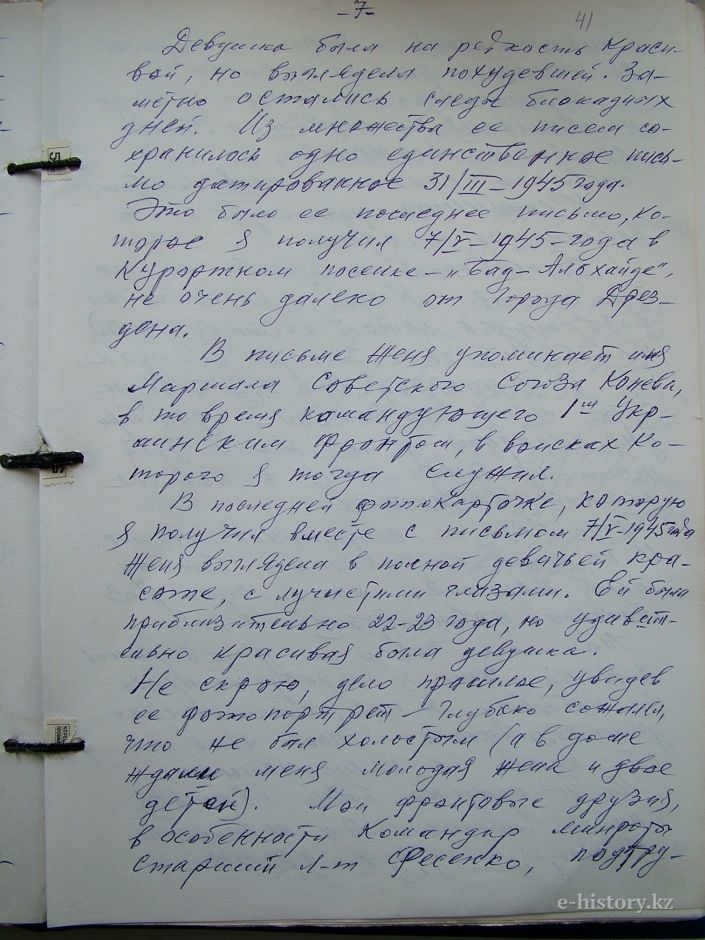
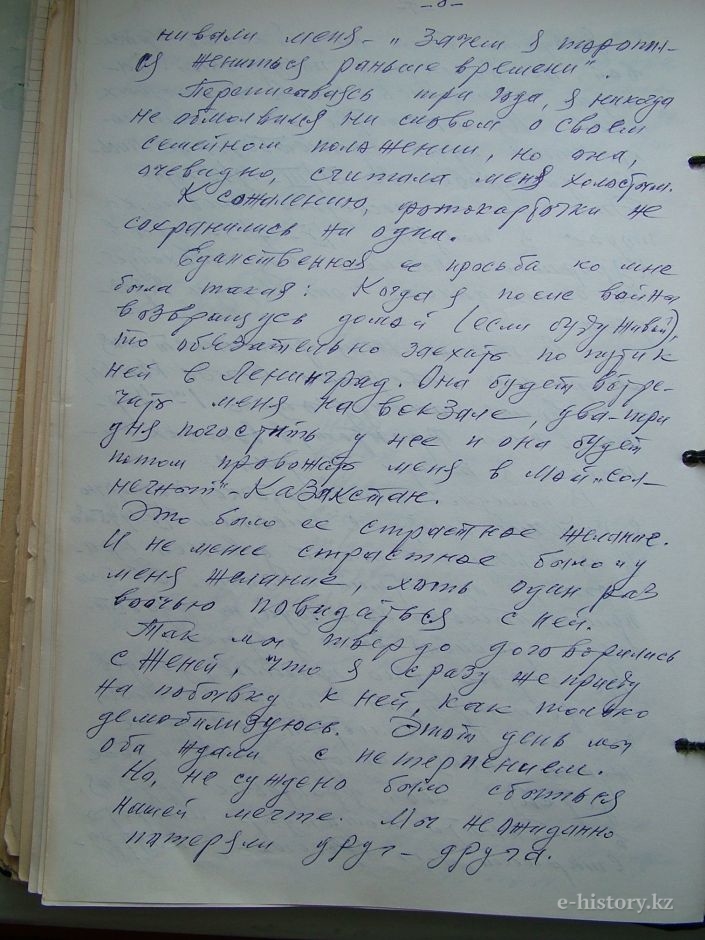
Esenzhan wrote about his memories: "Eugenia was very beautiful. During 3 years I never told to her about my marital status and she obviously considered me as a single. In the last letter of May 7, 1945 she asked me one favor, to visit her when o the way back to home. How this meeting would be happened? Obviously, it would not end as romantic drama. We would remain as good friends. I will keep the memory about this amazing Russian girl Eugenia Solovieva".
Dzhaugashtin wrote a lot about war. Slupash gave me him the manuscript. The war was not described as in books. It was real. The soldier writes how at the beginning of war Germans shot our soldiers and we were poorly armed. The situation improved only to autumn of 1942. He described life of soldiers. Their bath was in usual tent. They set a barrel, threw snow and heated".
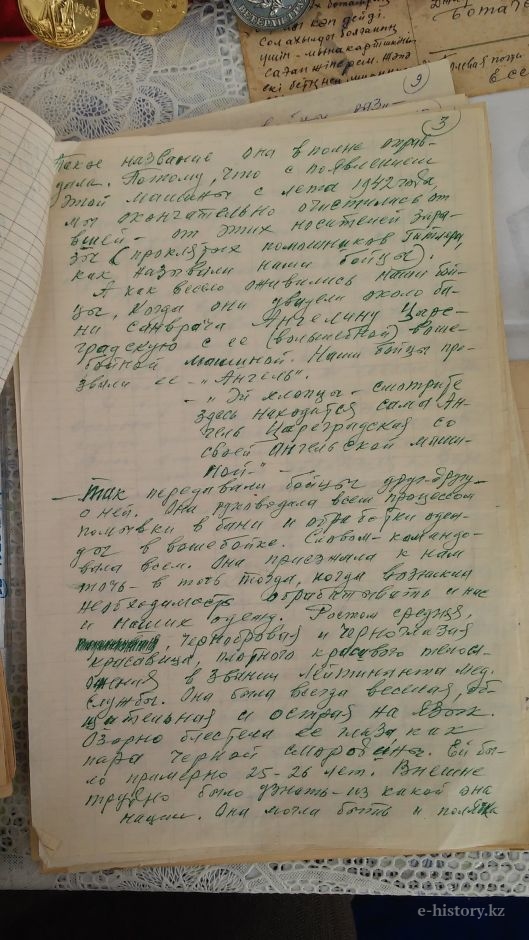
"Near tent there was a machine for processing the clothes. Soldiers called her machine for clearing from louses. They called louses bloody assistants of Hitler".
"The brother returned from war in 1945″ — says Slupash. — "He was never wounded, although there were a lot of moments when he could. Esenzhan considered that he was protected by the grandfather. His grandfather was born when Kazakhs beat the enemy therefore called him Zhaukashty. Zhau is translated from Kazakh as "enemy", kash — "ran".
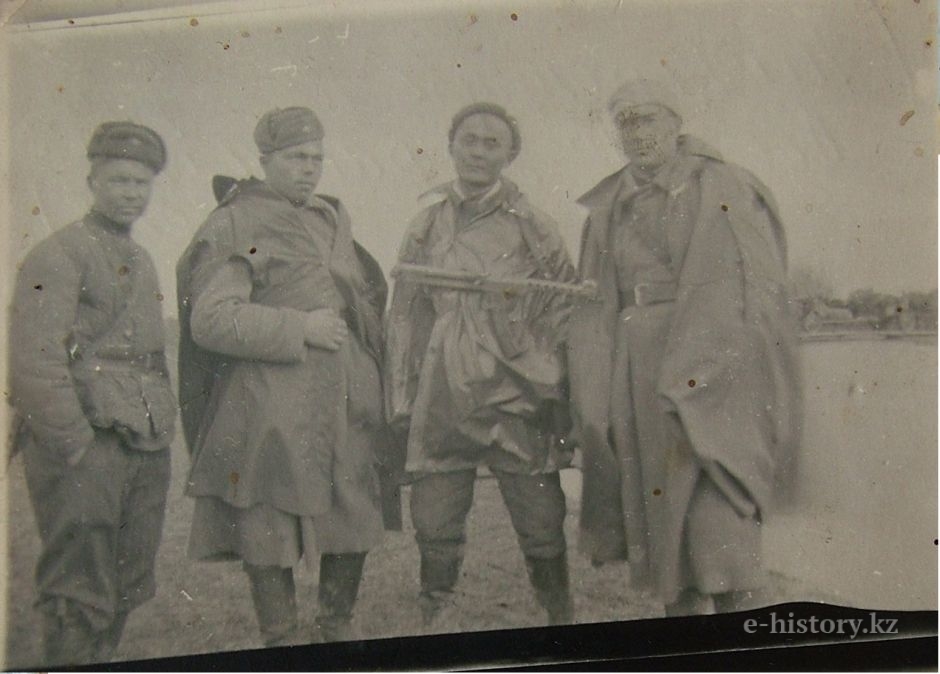
Esenzhan before war serving in a cavalry and fighting in Central Asia against basmach for merits in the Great Patriotic War was awarded the order Patriotic war of the 2nd degree, the medals "For Defense of Leningrad", "For Courage" and "For the Victory over Germany".
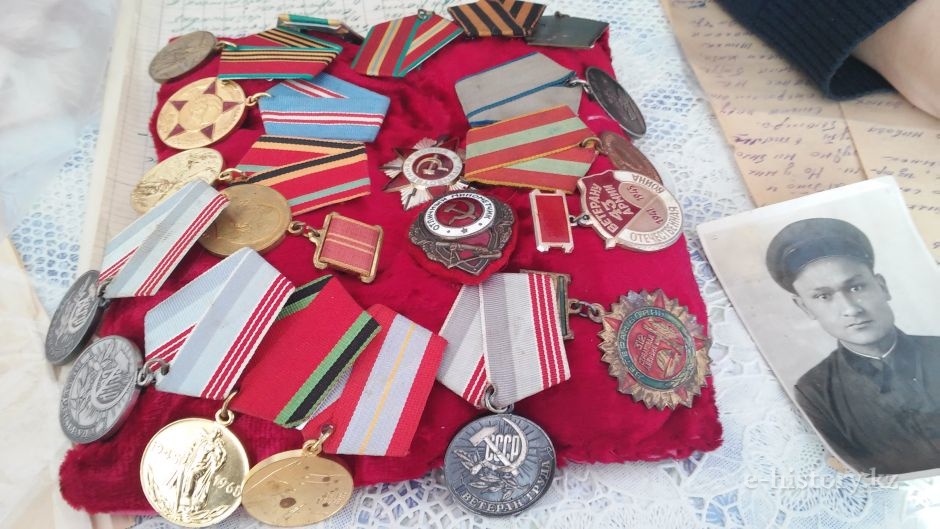
After war he worked in trade, died in 1991.
... Whether there was a love at the front? I think, yes. Love to the woman, to a family, children and love for the country. The love helped our great-grandfathers to win.
Alibi Alishbayev
Pupil of 8th grade of Nazarbayev Intellectual School of the physical and mathematical direction
Aktobe, Aktyubinsk area



